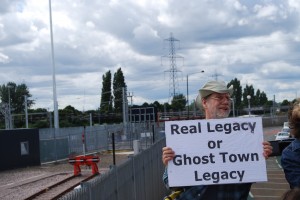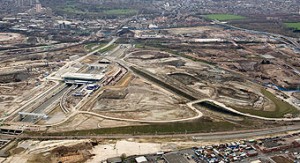
Back in March 2011 The Wellcome Trust made a £1bn offer to transform the Olympic Park into a ‘global hub for research and innovation’.
Yet the offer was rejected by the Olympic Delivery Authority who instead sold the Olympic Village to Qatari Diar and Delancey Estates for £557m, who will develop the site into a neighbourhood of over 2000 homes.
The Wellcome Trust noted on their website that the rejection was a huge disappointment for them, stating:
‘The Wellcome Trust is disappointed that the Government and the Mayor of London did not wish to take our proposals for the Olympic Park further. If our bid had been successful, our holistic vision for the Olympic Park and the legacy would have delivered a world-class centre for technology and innovation and up to 7000 high-quality new jobs, and it would have made a substantial contribution to the regeneration of East London’
The decision to reject the offer was initially founded on the basis that the £1bn bid made by The Wellcome Trust did not meet the amount that has already been invested into the Olympic Park prior to the bid and that their plans for the site would not provide taxpayers with sufficient value for money.
Yet both Saffron Woodcraft and Ian Birrell argue that this is a missed opportunity for an Olympic Legacy. Whilst The Wellcome Trust plan promised to provide 7000 jobs, the provision of social housing and ‘further social infrastructure’, this offer has been turned down in favour of investors who plan to transform most of the site into private housing, putting into question just how beneficial this decision is for the local residents and for taxpayers. Woodcraft and Birrell suggest that the International Olympic Committee’s decision is one based on short term rather than long term benefits. As Birrell argues:
‘…they are focussing on short-term profits by looking to sell the lucrative athlete’s village to the Qatari Royal family in conjunction with a private firm of property developers’.
This is just another decision, others including Greenwich Park and the new Stratford Westfield Shopping Centre, where the International Olympic Committee has put their interests and the interests of their sponsors before those of Londoners. Perhaps, as Birrell puts it:
‘Infrastructure is built to suit the demands of the International Olympic Committee, not the needs of the host city’.
Click London Olympics for more blogs
See our Olympics project pages for more information and videos.
Or visit PlanA our general blog on urbanism, planning and architecture.
Spectacle homepage
Befriend Spectacle.Docs on Facebook
Follow SpectacleMedia on Twitter



